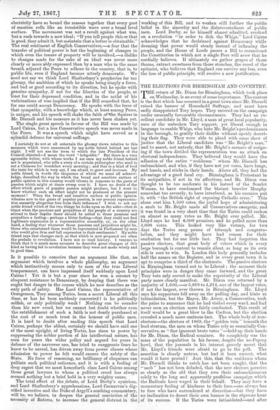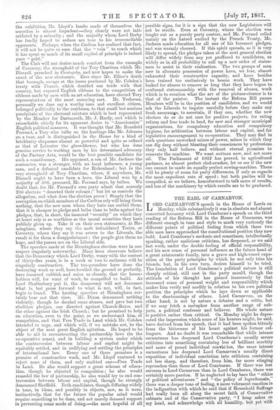THE ELECTIONS FOR BIRMINGHAM AND COVENTRY.
THE return of Mr. Dixon for Birmingham, which took place on Wednesday, is an event of some importance. The contest is the first which has occurred in a great town since Mr. Disraeli raised the banner of Household Suffrage, and must have sadly disappointed Tory hopes. They entered on the campaign under unusually favourable circumstances. They had an ex- cellent candidate in Mr. Lloyd, a man of great local popularity, sure of the unbroken Tory support, yet liberal enough in language to enable Whigs, who hate Mr. Bright's predominance in the borough, to gratify their dislike without openly desert- ing their flag. They were able to plead with some show of justice that the Liberal candidate was " Mr. Bright's man," and to assert, not untruly, that Mr. Bright's menace of resign- ing if the town divided the representation was an attack on electoral independence. They believed they would have the adhesion of the entire "residuum " whom Mr. Disraeli has enfranchised, and who, if they have not yet votes, have lungs; and hands, and sticks in their hands. Above all, they had the advantage of a good local cry. Birmingham is Protestant in its antipathies, if not in its affections, and Mr. Dixon was thought to be too moderate in his hatred of the Scarlet Woman, to have condemned the blatant brawler Murphy somewhat too severely, to have interfered, as his enemies put it, with " the British right of exposing Catholic error." This alone cost him 1,500 votes, the joyful hope of administering a snub to Mr. Bright made all Conservatives energetic, and it was found in a very short time that the Tories could reckon on almost as many votes as Mr. Bright ever polled. Mr. Lloyd says he had 6,000 promises, and he polled more than 4,000 votes. This looked very like victory, for two days the Tories sang paeans of triumph and congratu- lation, and they might have had reason for their exultation but for one little fact. They had forgotten the passive electors, that great body of voters which in every large borough is content to remain silent, as long as its own side is sure to win. In London this body generally includes half the names on the Register, and in every great town it is apt to comprise a third of the electorate. The passive electors in Birmingham turned out to be Liberal ; the moment their principles were in danger they came forward, and the great Tory vote only served to make the superiority of the Liberal party more clearly manifest. Mr. Dixon was returned by a majority of 1,600,—or 5,819 to 4,214, one of the largest votes, if not the largest, ever thrown in Birmingham. Mr. Lloyd says his supporters fell away on the polling day, and hints at intimidation, but the Mayor, Mr. Avery, a Conservative, took the pains to announce that he had visited every ward; and had never seen an election more fairly conducted. This result of itself would be a great blow to the Carlton, but the election revealed a much more ominous fact. The whole body of non- electors—the electors of 1869, the " golden vein " beneath the lead stratum, the men on whom Tories rely as essentially Con- servative, as "fine ignorant brute votes "—held up their hands for Mr. Dixon, the Radical nominee. So completely was the mass of the population in his favour, despite the no-Popery howl, that the journals in his interest gravely assert that Mr. Lloyd's friends were afraid to go to the poll. The assertion is clearly untrue, but had it been correct, what would it have proved ? Just this, that the residuum whom Mr. Disraeli thinks to catch has not been caught, that the "mob" has not been deluded, that the new electors perceive as clearly as the old that they owe their enfranchisement solely to the long and apparently profitless campaign which the Radicals have waged in their behalf. They may have a momentary feeling of kindness to their foes—one always has to foes who have surrendered at discretion—but they have no inclination to desert their own banner in the supreme hour of its success. If the Tories were intimidated—and after the exhibition Mr. Lloyd's lambs made of themselves the assertion is almost impudent—they clearly were not inti- midated by a minority ; and the majority whom Lord Derby has fondly hoped to seduce are true to his irreconcilable opponents. Perhaps, when the Carlton has realized that fact, it will not be quite so sure that the " vein " to reach which it has spent so much of its small capital of principle is indeed pure " gold." The Club will not derive much comfort from the example of Coventry, the stronghold of the Tory Chartism which Mr. Disraeli preached in Coningsby, and now hopes to make the creed- of the new electorate. Ever since Mr. Ellice's death that borough, savage at the losses produced by Mr. Cobden's treaty with France, which doubled our trade with that country, but exposed English ribbons to the competition of ribbons made by men with an art education, have elected Tory representatives of the most annoying sort. Mr. Treherne, personally we dare say a worthy man and excellent citizen, belonged politically to the residuum, to that small but noxious precipitate of the electoral mixture which is best represented by the Member for Dartmouth, Mr. J. Hardy, and which is remarkable chiefly for its apparent desire to "Americanize" English political manners. It was thought that Mr. Bousfield Ferrand, a Tory who talks on the hustings like Mr. Johnson on a tour, and is distinguished in the House for a kind of brickbatty eloquence almost as powerful and quite as refined as that of Leicester the glass-blower, but who has done genuine service to working men by his determined advocacy of the Factory Acts, would be the best possible candidate for such a constituency. His opponent, a son of Mr. Jackson the contractor, was a stranger, with no local influence, a young man, and a defeated candidate for Birkenhead ; but in the very stronghold of Tory Chartism, where, if anywhere, Mr. Disraeli ought to have been a hero, the Liberal won by a majority of 306, procured, Mr. Ferrand says, by bribes. We doubt that, for Mr. Ferrand's own party admit that scarcely 200 electors " deserted their colours ;" but let us concede the allegation, and what does the election prove ? Simply that the corruption on which members of the Carlton rely will bring them nothing, that the new men whom they hate can outbid them, that it is cheaper to pledge and bribe than to bribe against the pledges, that, in short, the immoral "security" on which they at heart rely is as worthless as the moral securities they have publicly given up. Take it on their own statements, at Bir- mingham, where they say the mob intimidated Tories, or Coventry, where they say it was averse to the Liberals, the result is for them a disappointment ; the people give them no hope, and the purses are on the Liberal side.
The speeches made at the Birmingham election were in one respect singularly noteworthy. Many keen observers believe that the Democracy which Lord Derby, weary with the contest of thirty-fire years, is in a week or two to enthrone will be singularly constructive. The ten-pounders have • done the destroying work so well, have levelled the ground so perfectly, have removed rubbish and ruins so cleanly, that the house- holders will, for want of work, be compelled to build. As Lord Shaftesbury put it, the democracy will not denounce what is, but press forward to what is not, will, in fact, begin to found. The husting speeches at Birmingham cer- tainly bear out that view. Mr. Dixon denounced nothing violently, though he decried some abuses, and gave but two abolition pledges, one directed against Church-Rates, and the other against the Irish Church ; but he promised to help on education, even to the point, as we understand him, of compulsion, and that Free Trade in Land which Mr. Cobden intended to urge, and which will, if we mistake not, be the object of the next great English agitation. He hoped to be able to aid in reconstructing the partnership laws (in the co-operative sense), and in building a system under which the controversies between labour and capital might be equitably settled, and in codifying and settling the principles of international law. Every one of these promises is a promise of constructive work, and Mr. Lloyd ventured to reject none of them, and only omitted one—Free Trade in Land. He also would support a great scheme of educa- tion, though he objected to compulsion ; he also would remodel the law of partnership, he also would try to end con- troversies between labour and capital, though he strongly denounced Sheffield. Both candidates, though differing widely in tone, in ideas, and possibly in objects, saw, as it were, instinctively. that for the future the popular mind would require something to be done, and not merely demand support in preventing some mode of doing,—the most hopeful of all possible signs, for it is a sign that the new Legislature will not be sterile. Even at Coventry, where the election was fought out as a purely party contest, and Mr. Ferrand relied mainly on the hatred excited by the French Treaty, Mr. Jackson made education for all one of his foremost pledges,. and was warmly cheered. If this spirit spreads, as it is very likely to spread, the pledges taken at the next general election will differ widely from any yet proffered to candidates, so• widely as in all probability to call up a new order of states- men to assist in their realization. The two groups of men now in alternate possession of power have, we fear, almost exhausted their constructive capacity, and have besides been trained too exclusively to besom work. They have looked for abuses to remove so long that they have begun to- confound statesmanship with the removal of abuses, work which is to creation what the art of the picture-cleaner is to that of the painter. The instant the Reform Bill passes Members will be in the position of candidates, and we would ask the Liberals to inquire carefully before they make any fresh assurances, to ascertain, if they can, whether the new electors do or do not care for positive projects, for rating reform and free trade in land, for new and stronger municipal organizations, for compulsory education and compulsory hygiene, for arbitration between labour and capital, and for legislative encouragement to co-operation. They may find in such questions unworked mines of power, mines in which they can dig deep without blunting their consciences by professions . they only half believe, and without eternal promises to renovate the machine. We want outturn now, and not more oil. The Parliament of 1832 has proved, in agricultural parlance, an almost perfect clod-crusher, let us see if the new one cannot be made an equally perfect sowing-machine. There- will be plenty of room for party differences, if only as regards the most expedient rate of speed ; but both parties will be compelled, as we believe, henceforward to talk more of results, and less of the machinery by which results are to be produced.































 Previous page
Previous page